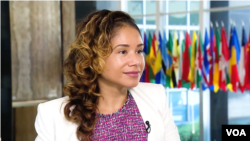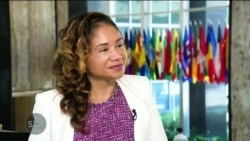U.S. President Joe Biden's administration in June appointed Desirée Cormier as the U.S. Special Representative for Racial Equity and Justice, a newly-created post which aims to combat systemic racism and injustice around the world.
In an exclusive interview, VOA's Straight Talk Africa host Haydé Adams spoke with Cormier Smith for insight into her new position and how it relates to the African continent.
This interview has been edited for clarity and brevity.
VOA: "So you are the U.S. special representative for racial equity and justice. This is a new position created by the Biden-Harris administration and you are the first person in this role. Tell us a little bit about why this role was created, and what does your new job entail?"
Cormier Smith: "So the creation of this role is a continuation of the Biden-Harris administration's commitment to advancing human rights and centering human rights in our foreign policies. It is an acknowledgement that the unfortunate reality is that for members of marginalized racial and ethnic communities, the basic premise outlined in the Universal Declaration of Human Rights — that all human beings are born free and equal in dignity and rights — is an aspiration but not a reality.
So the creation of my position is to really acknowledge that we need to center equity in our work, and I have the honor of joining the roster of an ambassador for religious freedom, ambassador to combat anti-Semitism, an ambassador for global women's issues, a special envoy for LGBTQI+ rights and a special advisor for disability rights to ensure that we are advancing foreign policy that really centers equity and working towards a world in which all human beings are free and able to live up to their full potential."
VOA: "Tell us a little bit more about you, and tell us about your background and what has prepared you for this role."
Cormier Smith: "Well, so I'm from Los Angeles — more specifically Inglewood, California — which until recently, whenever people heard about Inglewood or saw it in movies or television shows, it was always a negative thing. Lots of connotation about gangs and drugs and violence. But that's not the Inglewood I experienced. My family came from to Inglewood from Louisiana, and I was raised by my grandparents with my my mom as well. And my grandfather was a well-known civil rights activists. So, I can say that this is sort of in my blood.
I started my career in foreign affairs. I received a fellowship when I was in college to join the Foreign Service, and so I began my career as a foreign service officer. I did tours in Mexico, in South Africa as well as here in Washington D.C. I then worked in the private sector, working with major foundations and companies and startups interested in investing in countries across Southern and East Africa. And I helped them do that in a manner that created a sustainable and real benefit for the local communities in which they were investing. Then I joined civil society, and I advocated for more just humane and equitable foreign policies towards Africa, towards Europe and Eurasia and was beginning to build out a global work, global platform to combat global anti-black racism. Then I was honored to come back home to the State Department in 2021, where I served as a senior adviser in the Bureau of International Organization Affairs, where I led our work to advance racial justice issues multilaterally."
VOA: "I think one thing that Africans can relate to is how our place and its people can be framed or portrayed in a way that affects the way people are seen and perceived. America is often praised and criticized for having strings attached to its foreign aid, especially when it comes to diplomatic engagement with countries that have to improve their human rights record.
Is the work that you're going to be doing going to affect a country's relationship with the United States?"
Cormier Smith: "Let me start by saying this: We recognize that we are not perfect, and we are grappling with issues of racism, discrimination and xenophobia here in the United States as well. So we start from a perspective of humility, but we also recognize that these are global phenomena. And so we have to start with our own work and how we are engaging with these communities in the countries.
So let me be crystal clear that my job is not to admonish or lecture other governments on how they are treating marginalized racial and ethnic communities. We are starting this work by taking a critical assessment of our own policies, our own programs and our own engagements and how they are either supporting and uplifting marginalized racial or ethnic communities in each country or if facing the hard truth and acknowledging where we are falling short in addressing their marginalization."
VOA: "How do you see racial equity injustice figures into America's foreign policy? What's been missing in your view from the global conversation?"
Cormier Smith: "We have seen how every major crisis that we are facing today whether it be COVID-19, climate change, food insecurity, democratic backsliding has a disproportionate impact on members of marginalized racial and ethnic communities. When we fail to acknowledge that, our policies are not going to be as effective or enduring. So when we apply that lens to our work, as Secretary Blinken has said, we know that embedding equity across our foreign affairs work will increase the visibility of racial and other inequities and will lead to better informed foreign policies that will reduce the barriers to equality worldwide."
VOA: "If you look at the African continent, what are the issues and the specifics of those issues that you'd like the State Department to tackle? What will you be focusing on through your work, and what are the issues closest to your heart that you think deserve the greatest attention right now?"
Cormier Smith: "That's a really hard question. Two things are going to be critical in this work and that are very important that I clarify early on. First, this work is not about me being a quote-unquote ‘voice for the voiceless.’ It really is about listening to and centering members of marginalized racial and ethnic communities in our policies. These communities know better than anyone the challenges they face, and they also know better than anyone what they need to overcome these challenges.
But for far too long they have simply been excluded from the rooms where the decisions are being made that impact them. And this is especially true for indigenous communities. And I want to be clear that my portfolio does include indigenous communities and other marginalized ethnic groups around the world.
Secondly, this is not about me applying an American lens to the problem. We cannot apply a one-size-fits-all approach because while we know that racism, xenophobia and discrimination are a global phenomenon, they are manifested in unique and distinct ways in every single country around the world. So that's why it's critical that we start by listening to the members of these communities, and then that also will be planning to sit down with all of my colleagues across the Department of State in each regional bureau to have an honest conversation about how these challenges are manifested in their regions and in their countries."
VOA: "Is some of your job going to focus on the relationship between the U.S. and African countries, between what goes on internally in African countries or what goes on between African countries or all of the above?"
Cormier Smith: "My mandate is to promote and advance the human rights of members of marginalized racial and ethnic communities. My goal is to also combat systemic racism, discrimination and xenophobia wherever it exists. So wherever that is true in a country or in a region that's where we will focus."
VOA: "If we come back to you in let's say a couple of years time, what would you hope to have accomplished or fundamentally changed in this job and in this relationship between the United States and African countries?"
Cormier Smith: "That is such a hard question because this work is not easy. We're dealing with issues and challenges that have been baked into systems and institutions for centuries. So it's not going to be flipping a light switch. It really is, as Secretary Blinken likes to describe it, more like turning an aircraft. So I have to sort of manage my own expectations that this work is going to be — we have to be engaged in it for the long haul, and we are not going to see sort of immediate shifts. But as long as we're working towards progress, that's all I can ask. And in five years or a couple of years if you come back, I would like to report to you that we have effectively embedded a racial and ethnic equity lens into all of our work."











